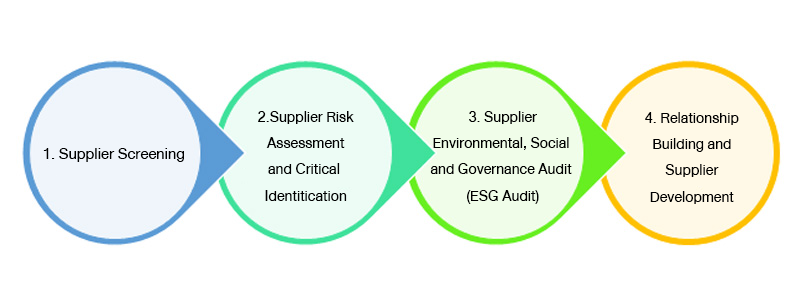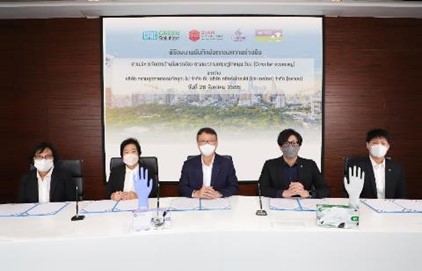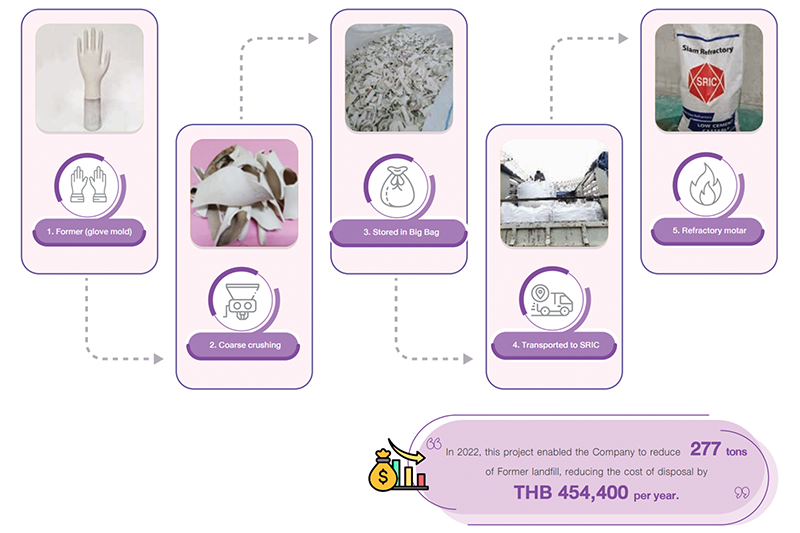Supply Chain Management
Importance
The Company focuses on sustainable supply chain management in accordance with international standards so that the Company’s partners operate in line with the Company’s sustainability practices, taking into account the management of environmental and social impacts, being ethical in conducting business, labor practices and fair trade, including in assessing risks, operating in accordance with human rights principles, giving attention to environmental impacts and business integrity starting from the fair and sustainable sourcing of raw materials to delivering the highest quality products to our customers.
Target and Performance
| Indicators | Target (Percentage) | 2022 Performance |
|---|---|---|
| Suppliers who were communicated Supplier Code of Conduct and Guideline | 100 | 100 |
| Suppliers signed acknowledgement Supplier Code of Conduct and Guideline | 100 | 98.38 |
| Suppliers complete the Environmental, Social and Governance (ESG) self-assessment questionnaire | 100 | 100 |
| Tier 1 suppliers were assessed for environment, social and governance (ESG) risk in their operating sites | 100 | 100 |
In 2022, the results of the environmental, social, and governance (ESG) self-assessment from suppliers and the ESG risk assessment in the operation areas found “no risk”.
Supply Chain Management Policy
The Company has a procurement policy. There is a process and criteria for selecting trade partners that are fair, transparent and verifiable. This includes avoiding doing business with any business partner that offers any dishonest benefits and strictly adhering to the Code of Conduct for Business Partners and Competitors in order to prevent trade monopolies, unfair competition and corruption, and promoting new sellers, giving priority to transactions with partners who share the same purpose as the Company on social and environmental responsibility, such as green procurement, fair employment, not using child labor or forced labor, non-violation of human rights and taking care of the environment, as well as promoting knowledge and understanding for business partners to have social responsibility.
The Company prepared a Business Partner Code of Conduct and Guidelines to promote sustainable business operations among its business partners in accordance with the Company’s business practices. This code of conduct is also an opportunity for the Company and its business partners to embrace shared values and participate in social and environmental development to create growth and sustainability together. In this regard, the principles used in the preparation of the Business Partner Code of Conduct and Guidelines, in addition to the legal/regulatory requirements and the Company’s business ethics, are also based on internationally recognized charters and standards by such organizations as the International Labor Organization (ILO) and the United Nations Global Compact (UN Global Compact).
Supplier Code of Conduct and Guidelines
Credit Term with Suppliers
The Company values the sustainable growth of business with stakeholders throughout its supply chain. The business terms and conditions must reflect the corporate governance that each supplier is complied with, as well as the quality of products/services under agreed timeline and the responsiveness of the communication and collaborative business development with the Company. The credit terms with any suppliers will be based on abovementioned considerations which incorporate the Company’s creditworthiness, as well as proper liquidity management of both parties. In general, our credit terms with key suppliers are in a range of 30-60 days.
| Credit Term | Average Credit Term in 2022 |
|---|---|
| 30 - 60 Day | 23 Day |
Supplier Management
The Company is aware of sustainable supply chain that is applied environmental, social and governance practices (ESG) integrate to supplier management approach with a focus on transparency and accountability throughout the process, as follows:

1. Supplier Screening
The Company will select new suppliers using comprehensive evaluation criteria in accordance with various standard systems that the Company has been certified such as BSCI, SMETA, ISO14001, ISO45001 and ISO22301 etc. Additionally, the Company reviews and conducts an evaluation form and selecting new suppliers. This form contains 5 assessment topics, a full score of 100, covering social issues such as human rights, labor, safety and the environment with regards to legal compliance, whether various measures are in place to reduce significant environmental impacts from operations, etc. If they pass the criteria, they will be approved and registered in the approved vendor list.
2. Supplier Risk Assessment and Critical Identification
The Company has established criteria for assessing the critical suppliers and ESG risks, with the aim of categorizing suppliers based on their risks. These criteria take into account the characteristics of products and services provided by suppliers, as well as the analysis of procurement costs for each group of goods and services. Additionally, classification criteria for suppliers have been set up to ensure appropriate management of suppliers. The criteria for suppliers can be divided into the following types:
- Tier 1 suppliers are suppliers who produce or provide services directly to the Company.
- Non-Tier 1 Suppliers are suppliers who produce or provide services to the Tier 1 suppliers.
- Critical Tier 1 Suppliers are critical suppliers who produce or directly provide services to the Company.
- Critical Non-Tier 1 Suppliers are critical suppliers who produce or directly provide services to the critical Tier 1 Suppliers.
3. Supplier Environmental, Social and Governance Audit (ESG Audit)
The Company will send a self-assessment form to its business partners at least once every 2 years. The assessment form used for monitoring is based on the requirements/laws related to the business partners such as ISO 9001, ISO 13485, ISO/IEC 17025, ISO 14001, ISO 45001, ISO 22000, BSCI Code of Conduct & SMETA, GMP, Halal and other relevant standards covering the environment, social and governance, including business continuity management. For the Critical Outsource group, the wholesaler must be audited at least once every year whereby the Quality System Department arranges a meeting for the relevant parties to review and summarize the supplier list that must be audited each year and create a monitoring plan and conduct audits in the operational area (On-site Audit).
4. Relationship Building and Supplier Development
The Company places great emphasis on sharing knowledge, developing potential, and enhancing the manufacturing and service capabilities of trade partners to meet desired standards. It also encourages suppliers to take social responsibility through regular communication, annual contractor training, study visits, meetings with partners, and annual supplier audits. The objective is to provide advice, collaborate on problem-solving, and improve the quality of raw materials and delivery to meet the Company's needs. If any business partner is found to have defects or poses a high ESG risk, the Company will prepare a corrective action plan to address the issues and provide advice to reduce operational risks.
Supplier development program

Waste Former to Refractory
This project is collaboration between STGT and SRIC, a subsidiary of SCG, whereby STGT sends its expired ceramic glove molds to be substituted raw material for the production of SRIC’s refractory mortar.

